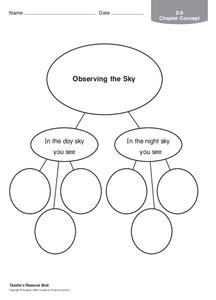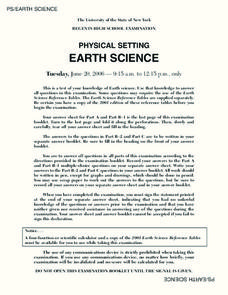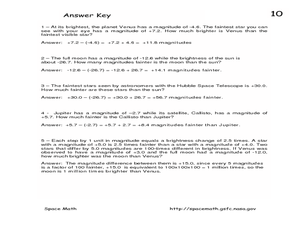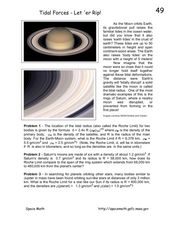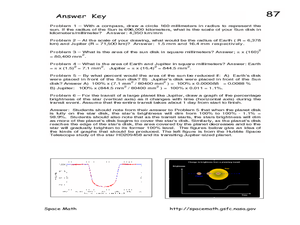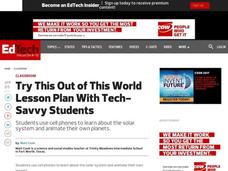Curated OER
Observing the Sky
In this sky worksheet, students will write down 3 things they see in the sky during the day and 3 things they see in the sky at night. This worksheet is a graphic organizer.
Curated OER
Parts of the Universe
In this universe worksheet, students will complete a graphic organizer by writing in the different parts of the universe, including a brief description of each of these parts.
Space Science Institute
The "All American" Eclipse Guide
Are you ready for the biggest astronomical event of the year? More importantly ... are you ready to share it with your scholars? Use a presentation filled with facts and diagrams to make sure everyone in class understands the importance...
ESL Kid Stuff
Our World
There's a beautiful world all around us! Learn about the features of our planet with a series of activities designed for English learners. Kids sing, dance, and read about nature with fun lessons and interactive play.
NOAA
Tides
Low tides, high tides, spring tides, neap tides, diurnal tides, semidiurnal tides, mixed tides ... just how many types of tides are there? The 10th installment of a 23-part NOAA Enrichment in Marine sciences and Oceanography (NEMO)...
media.yurisnight.net
Science Lesson Plan: Our Solar System: I Wonder?
Ever wonder why Pluto isn't considered a planet? Or how large the Earth is compared to the other inner planets? Explore the universe with a series of projects that simulate different aspects of our solar system. The activities require...
Star Date
Solar System Scale Model Demonstration
Explore outer space and decorate your classroom with an astronomy project. Learners create a visual model with the creation of a scaled solar system using different sized balls.
Journey Through the Universe
Our Solar System
Take your class on a journey through our solar system. Learners explore each planet, from Mercury to Pluto, and discuss various features that differentiate one from another. They complete activities related to the topics and discuss the...
NOAA
The Great, Glowing Orb What You Will Do: Make a Solar Heat Engine
How is solar energy able to move wind and water to control the climate? Scholars explore the concept of solar energy in the first of 10 activities in the Discover Your Changing World series. They follow instructions to build homemade...
American Museum of Natural History
Cosmic Cookies
Scholars read about each planet then bake a plate of cosmic cookies—no-bake cookies decorated to look like the planets; Mercury, Venus, Earth, Mars, Jupiter, Saturn, Uranus, Neptune, and Pluto.
Curated OER
Space Words and Comparatives
Which is bigger: the sun or the moon? Which is nearer: the planets or a star? English Language Learners first located a series of space-related nouns and adjectives in a word search, and then identify the comparative and superlative...
New York State Education Department
Regents High School Examination: Earth Science - June 2006
In this earth science worksheet, high schoolers answer fifty multiple choice questions and thirty-three short answer questions in preparation for the earth science final exam.
Core Knowledge Foundation
Astronomy Tell It Again!™ Read-Aloud Anthologys
A read-aloud anthology focuses on astronomy. Each week for three weeks, first graders are introduced to and listen to a text, answer comprehension questions, then complete extensions that include a learning activity and skills practice....
Curated OER
Gravity - Do Some Research
In this gravity research worksheet, students read the questions and then complete research on gravity, gravity and the Sun and Moon, and all the planets' pulling forces.
Curated OER
The Earth in Space
Young scholars use computer images to explain why the Earth has seasons and examine the phases of the moon. They create 3-D images and present them to the class. They answer a series of questions at the end of the lesson.
Curated OER
The Stellar Magnitude Scale
In this stellar magnitude scale worksheet, students use a scale showing the magnitude of objects in the sky to answer 5 questions about the brightness of the moon, the planets and stars.
Curated OER
Yesterday, Today and Tomorrow--Measurements of Time
In this measurement of time instructional activity, students read a short article and then look at 12 pictures and draw a line from each one to either the sun or the moon. Students distinguish whether each picture is happening in the day...
Curated OER
Gravity and the Planets
In this gravity instructional activity, students read about the solar system and the effects of the gravity of the sun, the planets and the moon on the orbits of the planets. They answer three critical thinking questions about gravity.
Curated OER
Tidal Forces-Let'er Rip!
In this tidal forces worksheet, students read about the gravitational pull from the moon that causes the ocean tides. Students solve 3 problems including finding the Roche or the tidal radius for the Earth and Moon, comparing the Roche...
Curated OER
Cosmic Wheels
Students build a scale model of the Solar System and determine the time other planets take to travel around the Sun in comparison to the time of the Earth's revolution. The velocity of the planets are also determined in this lesson.
Curated OER
Kepler-The Hunt for Earth-like Planets
In this hunt for planets worksheet, students read about the Kepler satellite used to detect exoplanets. Students solve 6 problems including drawing a sun disk and determining the scale in kilometers/millimeter, finding the area of the...
Curated OER
Out of This World
Fifth graders animate their own planets. In this solar system lesson, 5th graders use smartphones and the software, GoKnow Sketchy, to create images for presentations on their created planets that appear to be animated when played...
Curated OER
The North (Wall) Star
Students engage in a instructional activity which shows them that celestial navigation is the art and science of finding one's geographic position by means of astronomical observations, particularly by measuring altitudes of celestial...
Curated OER
World In Motion Curriculum
Students explore the night sky and its solar system. Using a Digitarium planetarium system, students observe four constellations. They discover the phases of the moon and eclipses. Students recognize the difference between normal and...
Other popular searches
- Earth Moon Sun System
- Earth Sun and Moon
- Earth/sun/moon
- Sun and Moon Observations
- Sun Moon Earth
- Earth, Sun and Moon
- Space, Sun and Moon
- Earth and Moon and Sun
- Sun Moon Stars
- Moon, Sun and Stars
